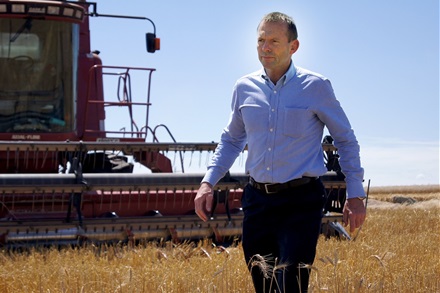Australia: All eyes on China FTA

The Land | 10 Oct, 2013
Australia: All eyes on China FTA
COLIN BETTLES
ONGOING regulatory uncertainty and political friction towards investment in Australian agribusiness by foreign state-owned entities could jeopardise plans to conclude Australia’s stalled free trade agreement (FTA) with China over the next year.
The new Coalition government held talks at the Asia-Pacific Economic Cooperation (APEC) forum in Bali this week which produced some encouraging signs for agricultural trade liberalisation, but no tangible conclusions.
Federal Trade and Investment Minister Andrew Robb met individually with 19 of his APEC counterparts on the sidelines of meetings in Bali and discussed agricultural trade.
“I took that opportunity with almost all of them (APEC counterparts) to emphasise that this will be the century of food and water security which increases the necessity for the liberalisation of agricultural trade across inter-linking bilateral, regional and multilateral negotiations,” he said.
Mr Robb said agriculture would also be a key focus at the ninth World Trade Organisation (WTO) ministerial conference in Bali in December and in Australia’s priority FTA negotiations with Korea, Japan and China.
The National Farmers’ Federation (NFF) is expected to attend the WTO conference along with members of the Cairns Group which represents 19 agricultural exporting countries - accounting for more than 25 per cent of the world’s agricultural exports - who are committed to reforming agricultural trade.
Prime Minister Tony Abbott said APEC was a critical forum where the region’s leaders gathered to address trade matters.
On average over the last couple of decades, the forum has seen tariffs in APEC countries drop against each other by 16 to 6 per cent, he said.
Around APEC, Mr Abbott met with Chinese President Xi Jinping to advance trade relations between the two countries.
Following an invitation from the Chinese President, Mr Abbott plans to visit China in the first half of next year to make relations between the two countries “broader and deeper and stronger”.
He intends to travel with a significant delegation of Australian business leaders, State premiers, and science and cultural representatives.
“The point I made on election night was that Australia is open for business and this is a message that I am very keen to repeat over and over again to our regional leaders,” he said.
Mr Abbott said he would be disappointed if a significant FTA with China was unable to be concluded within 12 months and didn’t include all of Australia’s demands.
“But whatever we can get, which is a substantial advance on where we are, is worth having,” he said.
“I’m confident that we can get a good agreement within 12 months.
“Let’s face it, the Kiwis, our friends across the Tasman, have had a series of agreements including one with China, which have been very good for their economy, particularly for their agricultural exports.”
But Opposition backbencher Andrew Leigh said the Coalition’s inherent resistance to foreign state-owned enterprises buying Australian farm land or agribusinesses, and China’s desire to increase off-shore investment, was a major sticking point and stumbling block to finalising the FTA.
Mr Leigh said agrarian socialists in the National Party were “pushing very strongly against foreign investment” and “scare-mongering” against the “sensible economic wing of the Coalition” who back foreign investment.
Opposition Trade spokesman Richard Marles said Mr Abbott’s posturing on free trade at the APEC summit would also amount to nothing, given the Coalition had plans to lower the Foreign Investment Review Board’s (FIRB) threshold for examining agricultural land purchases, from $248 million to $15 million.
“The Coalition’s xenophobia is putting at risk hundreds of thousands of Australian jobs,” he said.
But NSW Liberal Senator Bill Heffernan said any accusations of xenophobia were “pure rubbish”.
Senator Heffernan said his party welcomed foreign investment in Australian agriculture provided it was genuinely in the national interest and generated fair commercial outcomes for all parties.
But he said the production and export of any food commodities from those foreign owned assets shouldn’t be allowed to distort local markets or economies, or avoid paying taxation revenues in Australia.
Senator Heffernan said the Foreign Acquisitions and Takeovers Act needed to be updated and strengthened to reflect the recent “phenomena” of foreign sovereign investment.
He said the FIRB also needed more powers and greater expertise to assess whether any foreign government acquisitions were in the national interest or could cause long-term economic harm.
Talking to media at the APEC summit, Mr Abbott said foreign state-owned enterprises could invest in Australia.
But he said they faced FIRB scrutiny “from the first dollar rather than simply at the standard $240-odd million threshold”.
Mr Abbott said he made it “crystal clear” in his meeting this week with the Chinese President that Australia welcomed foreign investment, including from China.
Mr Abbott also had bilateral discussions with representatives from Singapore, Thailand, Canada, Malaysia, Mexico, PNG and US Secretary of State, John Kerry.
National Farmers’ Federation president Duncan Fraser welcomed the federal government’s commitment to finalising the China FTA within one year, but cautioned against signing a deal at any cost.
Mr Fraser said any FTA with China – like negotiations with Japan and Korea – must take a holistic view of Australian agriculture and not leave any key agricultural commodities out.





